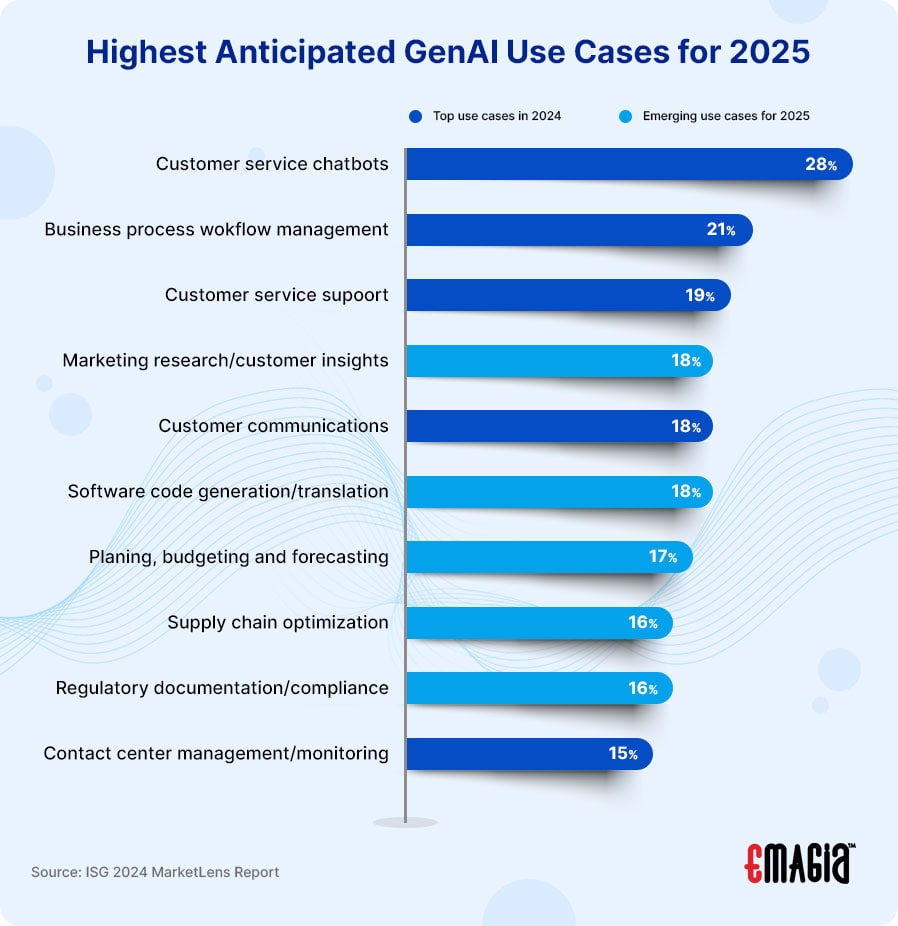In just two years, Generative AI (GenAI) has emerged as one of the most innovative technologies of the 21st century, reshaping industries from entertainment to healthcare. Its ability to create new content, enhance decision-making, and optimize processes positions generative AI not only as a technological advancement but as a driver of innovation. Although still in its early stages, adoption presents significant opportunities and challenges.
According to ISG’s State of the Generative AI Market report, the market is poised for substantial growth and disruption. This article explores the trends, opportunities, challenges, and future directions of generative AI.
Introduction to Generative AI
GenAI refers to algorithms that produce new content based on existing data, including text, images, music, and video. Foundational technologies such as Generative Adversarial Networks (GANs) and transformer models, like OpenAI’s GPT series, have advanced the field, enabling more sophisticated capabilities.
Key components of generative AI include:
- Natural Language Processing (NLP): Essential for understanding and generating human language.
- Computer Vision: Enables the generation of realistic images and videos.
- Reinforcement Learning: Facilitates the creation of adaptive systems that learn from their environments.
- Data Augmentation: Enhances training datasets, allowing models to learn more effectively.
Current Market Landscape
Growth Projections
Spending on GenAI will increase by 50% in 2025 compared to 2024, driven by advances in cloud computing and processing power, according to ISG, which in 2024 awarded Emagia with a “Rising Star” distinction in its Invoice-to-Cash providers assessment. ISG analysts forecast the market will exceed $100 billion in the next few years, with significant investments from startups and established companies. The reduction in entry barriers, primarily due to cloud advancements, is making generative AI accessible to a broader range of businesses.
Industry Adoption
Generative AI has applications across a wide array of industries. Sectors such as healthcare, media, finance, and manufacturing are increasingly integrating generative AI to drive efficiency and innovation. Key use cases include:
- Healthcare: Drug discovery and personalized medicine.
- Media and Entertainment: Enhancing content creation, from scriptwriting to animation.
- Finance: Supporting fraud detection and risk management.
- Manufacturing: Optimizing design processes and supply chain logistics.
Competitive Landscape
The competitive landscape comprises both major players and startups. Companies like OpenAI, Google, Microsoft, Meta Platforms, IBM, and others are heavily investing in generative AI, while startups are carving out niche applications. Despite this, challenges such as market saturation, data access, computing power, and talent shortages persist, creating barriers to entry. Additionally, partnerships between large firms and startups can sometimes stifle competition, with regulatory hurdles, especially in Europe, adding complexity.
Key Trends Shaping the Market
Several trends are driving the generative AI market:
- Democratization of AI Tools: The rise of no-code and low-code platforms is enabling non-technical users to harness generative AI, expanding its practical applications across various sectors.
- Integration with Existing Systems: Generative AI is most effective when integrated with existing IT infrastructure. Businesses are prioritizing the incorporation of generative models into workflows to enhance productivity without overhauling legacy systems.
- Enhanced Collaboration Between Humans and AI: Generative AI augments, rather than replaces, human creativity. Emerging tools are fostering real-time human-AI collaboration, blending the strengths of both for superior outcomes.
Opportunities for Businesses
Innovation in Product Development
Generative AI offers businesses the opportunity to accelerate product development. By simulating scenarios and generating design prototypes, companies can reduce time-to-market and lower costs.
Personalized Customer Experiences
Generative AI enables the creation of highly personalized customer experiences, from marketing messages to product recommendations, enhancing engagement and loyalty.
Cost Reduction and Efficiency Gains
Automating content creation and data analysis through generative AI can lead to significant cost savings, streamline workflows, and free up human resources for more strategic tasks.
New Revenue Streams
Generative AI is unlocking new revenue streams, with businesses offering AI-powered subscription models, consulting services, and entirely new products based on generative capabilities.
Challenges and Considerations
Despite its promise, the generative AI market faces notable challenges:
- Data Quality and Bias: Generative AI models depend on high-quality data. Poor data can result in biased outputs, raising ethical and operational concerns.
- Technical Complexity: Implementing generative AI solutions is technically complex and often requires specialized expertise, particularly in integrating these tools with existing systems.
- Rapidly Evolving Landscape: The fast pace of innovation in generative AI makes it difficult for businesses to keep up. Companies must remain agile to capitalize on new advancements.
- Public Perception and Trust: Public trust will be critical to widespread generative AI adoption. Transparency and ethical practices are essential for building trust with customers and stakeholders.
Future Directions
Advancements in Technology
Ongoing research will drive further sophistication in generative models. Developments in multimodal AI will enable the generation of content across multiple mediums, supporting a broader range of applications.
Increased Collaboration and Open-Source Initiatives
Collaboration among tech companies, academia, and governments will be crucial in overcoming the challenges facing generative AI. Open-source initiatives will democratize access and spur innovation.
Expansion of Use Cases
As the technology matures, new use cases will emerge in industries such as education, law, and agriculture. The ability of generative AI to automate tasks and uncover insights will drive innovation across sectors.
Greater Focus on Ethical Considerations
With increased regulatory scrutiny, companies will need to prioritize ethical AI practices. Establishing responsible AI frameworks will be critical for ensuring sustainable market growth.
Conclusion
The generative AI market is on the verge of significant transformation, fueled by rapid technological advancements and broadening adoption across industries. Businesses that embrace generative AI stand to innovate, enhance customer experiences, and drive efficiency. However, the challenges of navigating the technical and ethical complexities of this powerful technology cannot be understated. The future of generative AI will be defined by the balance between human creativity and machine capabilities, unlocking the next wave of innovation.
FAQ
Who is ISG?
ISG (Information Services Group) is a leading global technology research and advisory firm. A trusted business partner to more than 900 clients, including more than 75 of the world’s top 100 enterprises, ISG specializes in digital transformation services, including automation, cloud and data analytics; sourcing advisory; managed governance and risk services; network carrier services; strategy and operations design; change management; market intelligence and technology research and analysis. Founded in 2006, ISG focuses heavily on research and analysis based on the industry’s most comprehensive marketplace data. In ISG’s 2024 Provider’s Lens Finance and Accounting Platforms report on SaaS providers, it rated Emagia a “Rising Star” on the strength of its AI-powered copilot/digital assistant (Gia) and its ongoing dedication to innovation illustrated by research & development spending.
What is Generative AI (GenAI)?
Generative AI (genAI) is a fast-emerging variant of AI that broadly describes any type of artificial intelligence (AI) that can create a wide variety of data such as new text, images, video, audio, or 3D models. Technically, this type of AI learns patterns from existing data and generates new and unique outputs with the same statistical properties.









